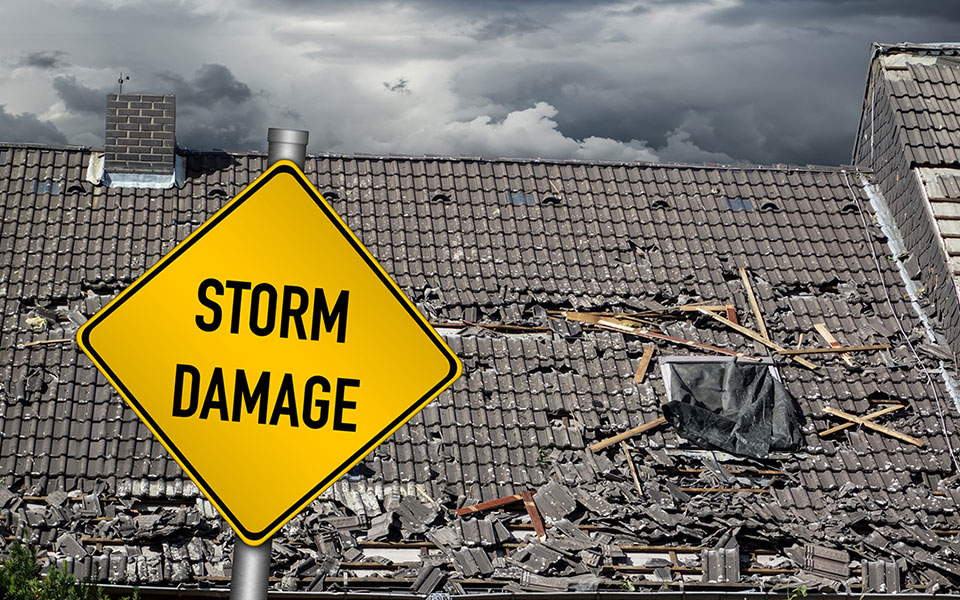Windstorms can result in substantial property damage for business owners.. Windstorm insurance is a specialty property and casualty insurance designed to provide for damages caused by high wind events such as hurricane-force winds, tropical depressions, tropical storms, tornados, hail and other weather conditions with gusts surpassing 35 mph.
Conducting a Comprehensive Windstorm Vulnerability Assessment
With hurricane and tornado season here, organizations can mitigate losses by protecting roofs, windows, doors and equipment. Consider these tips to prevent windstorm damage.
Protect Your Roof from High Winds
- Hire a licensed professional to inspect your building to ensure the roof and other building connections comply with or exceed local wind-loading requirements.
- Inspect worn areas, flashing and gutters for needed replacement.
- Clean debris-blocking drainage.
- Verify all roof sheathing and connections are secure to prevent updrafts from lifting off the roof.
- Secure all HVAC units.
Reinforce Your Exterior Walls, Windows & Doors
- Guard openings with approved protection including shutters, plywood or impact-resistant film to defend against windborne debris.
- Consider installing singlewide garage doors that are less vulnerable to wind damage.
- Verify overhead doors are braced and able to withstand high winds.
- Investigate that siding and windows are securely attached.
- Use triple-hinged entry doors.
- Inspect and seal building cracks that could cause damage.
- Install impact-resistant glass to prevent shattering and barrier against wind damage.
- Add impact-resistant shutters on windows and glass doors for additional protection.
Secure All Your Equipment & Valuables
- Bolt bookcases, shelving, cabinets and other large furniture to wall studs.
- Anchor fuel tanks.
- Store high-value items in a safe or secured area away from windows or doors.
- Document all equipment and valuables, including photos and detailed item descriptions. Secure a digital backup and provide your insurance advisor with copies.
Examine & Fortify Your Outdoor Areas
- Anchor all equipment and inventory stored outside or move inside if a storm approaches.
- Routinely trim and maintain all large vegetation and trees close to your building.
- Ensure storage containers and outbuildings are anchored securely.
- Verify your outdoor signage is secure and designed to withstand high winds.
- Secure all dumpsters, fencing and light fixtures.
- Avoid using landscaping rocks or pebbles.
Weather-Protect Your Vehicles & Fleet
- Store vehicles inside a garage or storage building.
- Refrain from parking vehicles under trees, power lines or lampposts as they could cause damage.
- Consider sending vehicles home with employees if they cannot be stored inside your facility.
- Capture photos of your fleet vehicle’s interior and exterior to provide to your insurance company in the event your vehicle is damaged or destroyed during the storm.
Looking for protection tips from other weather events? Download our Severe Weather Preparedness Guide for help with hurricanes, flooding, wildfires and much more!
Windstorm Damage Protection: How Your Broker Can Help
Even with the best prevention tactics, a windstorm can wreak havoc on your property and operations. Ensuring you have the right insurance protections in place is crucial for getting your business up and running quickly and avoiding devastating financial repercussions. Here’s how your broker can assist:
Conducting Annual Loss Control Inspections
Work with your advisor to perform a thorough loss control inspection of your property and operations each year. This proactive step can identify potential vulnerabilities before a storm hits.
Reviewing & Updating Insurance Policies
Regularly review your insurance policies to ensure comprehensive coverage. Key policies to consider include:
- Commercial Property: Covers damage to buildings and contents caused by high winds, including roof damage, broken windows, and damage to inventory and equipment.
- Business Interruption: Provides coverage for lost income and operating expenses if the business is forced to close temporarily due to wind damage.
- Commercial Auto: Protects company vehicles from wind-related damages.
- Flood Insurance: While typically separate from wind coverage, it’s essential for protection against flooding that may accompany severe wind events, particularly in high-risk areas.
- General Liability: Covers legal and medical expenses if someone is injured on the property due to wind-related damage.
- Workers’ Compensation: Provides coverage for employees who might be injured while preparing for or dealing with the aftermath of a high wind event.
Ensuring comprehensive coverage with these policies can help mitigate financial losses and facilitate a quicker recovery after high wind incidents.
Filing a Weather-related Damage Claim
Your trusted insurance advisor can provide valuable support during a weather-related claim such as:
- Initial Assessment: Helps evaluate the damage and determine the extent of coverage level and impact on your premiums if a claim is necessary.
- Documentation Guidance: Advises on the records to support your claim such as photographs and receipts.
- Policy Review: Ensures you understand your coverage, deductibles and exclusions.
- Claim Submission: Verifies all forms are filled out correctly and required information is included to reduce delays and rejections.
- Intermediary: Communicates with the insurer to expedite the claims process and advocate for a fair settlement.
- Post-Claim Assistance: Assists in determining the next course of action, such as repairs or replacements. Can assess your policy to enhance coverage for your future protection.
By leveraging the expertise and support of your insurance broker, you can navigate the complexities of filing a weather-related claim more efficiently and effectively, ensuring a smoother recovery process.
We’re Here to Help Prevent Windstorm Damages
&Severe weather events like hurricanes, tropical storms, and tornadoes can to your commercial property. Insufficient insurance coverage could hinder your business’s recovery. In addition to commercial property insurance, adopting risk management strategies can provide support in case of emergencies. For guidance on your insurance coverage or implementing risk management practices, connect with a member of our team.
© Copyright CBIZ, Inc. All rights reserved. Use of the material contained herein without the express written consent of the firms is prohibited by law. This publication is distributed with the understanding that CBIZ is not rendering legal, accounting or other professional advice. The reader is advised to contact a tax professional prior to taking any action based upon this information. CBIZ assumes no liability whatsoever in connection with the use of this information and assumes no obligation to inform the reader of any changes in tax laws or other factors that could affect the information contained herein. Material contained in this publication is informational and promotional in nature and not intended to be specific financial, tax or consulting advice. Readers are advised to seek professional consultation regarding circumstances affecting their organization.
“CBIZ” is the brand name under which CBIZ CPAs P.C. and CBIZ, Inc. and its subsidiaries, including CBIZ Advisors, LLC, provide professional services. CBIZ CPAs P.C. and CBIZ, Inc. (and its subsidiaries) practice as an alternative practice structure in accordance with the AICPA Code of Professional Conduct and applicable law, regulations, and professional standards. CBIZ CPAs P.C. is a licensed independent CPA firm that provides attest services to its clients. CBIZ, Inc. and its subsidiary entities provide tax, advisory, and consulting services to their clients. CBIZ, Inc. and its subsidiary entities are not licensed CPA firms and, therefore, cannot provide attest services.















